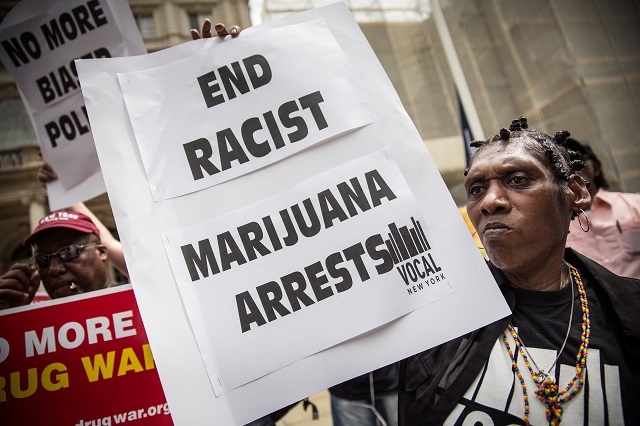
Senate Minority Leader Chuck Schumer has introduced legislation that would decriminalize cannabis at the federal level, a sign that the Democratic leadership is finally ready to align itself with a majority of voters and embrace marijuana reform ahead the 2018 midterm elections.
Senator Schumer announced his legislation on April 20 or “4/20,” a festive national holiday for marijuana fans. He joins a growing list high-profile Democrats who have thrown their support behind marijuana reform packages, including New Jersey Sen. Cory Booker, Vermont Sen. Bernie Sanders and New York Sen. Kirsten Gillibrand, who are all thought to be eyeing presidential bids in 2020.
Laws prohibiting marijuana use are gradually unraveling on a state-by-state basis, and polls show that public support for legalizing and decriminalizing that nation’s favorite illicit drug has steadily climbed to about 61 percent. Since 2014, tax revenues from legal weed sales have surpassed $700 million in Colorado alone.
“With this announcement, Senator Schumer has effectively made it clear that a legislative priority for the Democratic Party is to end the federal prohibition of marijuana,” said Justin Strekal, political director of the National Organization for the Reform of Marijuana laws, in a statement.
Schumer’s legislation would remove marijuana from the psychoactive substances listed on the Controlled Substances Act to end the federal cannabis prohibition. Legalization and regulation of marijuana would be left up to the state governments, a process that has already started across the country.
However, under Schumer’s bill, federal police would still be able to arrest people for “trafficking” marijuana from states where it’s legal to states where it’s prohibited, ensuring that some people would continue being criminalized for taking marijuana across state lines.
Legislation introduced by Senator Booker and Sen. Ron Wyden would go even further by using federal funding to encourage states where marijuana is illegal to change their laws, particularly if low-income people and people of color are disproportionately arrested on marijuana charges.
The bill — known as the Marijuana Justice Act for its focus on addressing the racist legacy of marijuana criminalization — is a direct challenge to the President Trump and Attorney General Jeff Sessions, who have revived tough-on-crime rhetoric from the failed war on drugs as part of a well-publicized crackdown on immigration and illegal drug sales.
The Marijuana Justice Act would also expunge federal marijuana crimes from criminal records and allow prisoners incarcerated for federal marijuana offenses to petition a court for resentencing — an idea that a majority of voters appear to support.
A new survey by DrugAddictionNow.com, an online addiction and recovery resource, shows that more than 90 percent of Democrats and 86 percent of Independent voters believe drug offenders should be pardoned or at least have their sentences reduced if the drug they were charged with using or selling is decriminalized. A whopping 89 percent of Democrats and 73 of Independents said sentencing for drug crimes is racially biased.
Nine in 10 Black people surveyed said drug sentencing is racially biased, but less than half of Republicans agreed. While a majority of Republicans said prisoners of the drug war should be pardoned or at least have their charges reduced, 23 percent said nothing should change for drug offenders after decriminalization. That’s only a few points higher than the percentage of the total United States population that voted for Trump in the last election.
In general, a majority of people surveyed said those convicted of simply possessing hard drugs like heroin and methamphetamine should not go to prison, and actual incarceration rates for drug crimes tend to be higher than most Americans prefer, according to the survey.
Still, bipartisan sentencing reforms have repeatedly stalled in Congress, thanks in part to opposition from Sessions, who has clashed with Republican colleagues over the issue. Sessions also suspects that violent criminals are operating in medical cannabis markets and has used the opioid crisis as an excuse to demand stiffer sentences for drug crimes, a position that no longer appeals to a clear majority of voters.
While sentencing and broader drug policy reforms are not gaining steam in the GOP-controlled Congress, Democrats are betting they can connect with voters on marijuana during the midterms. Advocates have spent years pushing mainstream politicians to embrace cannabis decriminalization, and now that Trump and Sessions have revived the war on drugs, Democrats are finally ready to use weed as a wedge issue.
Join us in defending the truth before it’s too late
The future of independent journalism is uncertain, and the consequences of losing it are too grave to ignore. To ensure Truthout remains safe, strong, and free, we need to raise $33,000 in the next 2 days. Every dollar raised goes directly toward the costs of producing news you can trust.
Please give what you can — because by supporting us with a tax-deductible donation, you’re not just preserving a source of news, you’re helping to safeguard what’s left of our democracy.